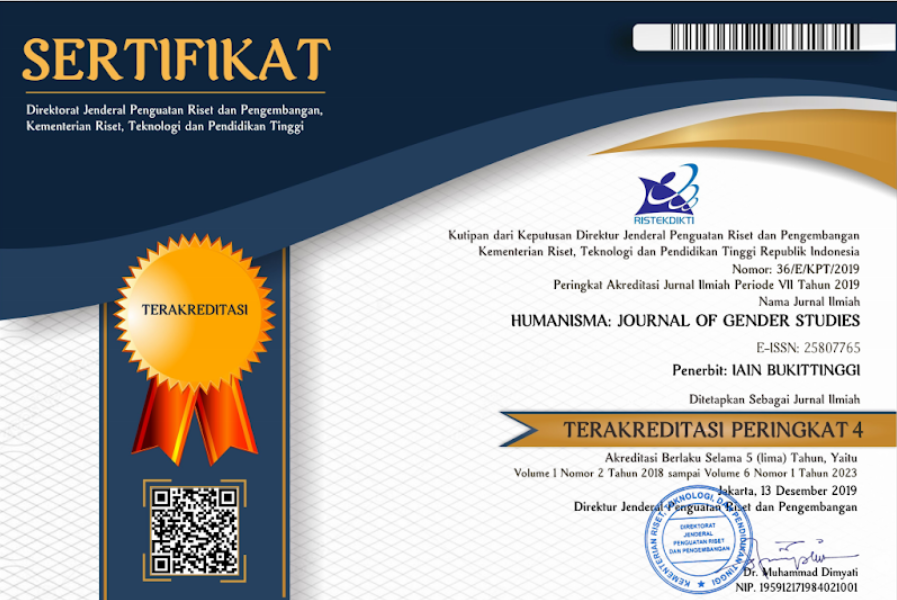Analysis of Differences in Student Learning Achievement: A Review of Gender and Majors
DOI:
https://doi.org/10.30983/humanisme.v6i2.5955Keywords:
Learning Achievement, Gender, Academic Major,Abstract
The article explains student learning achievement, then looks at differences in student learning achievement in terms of gender and major aspects. This research uses a combined approach through descriptive and inferential quantitative approaches. Data collection using questionnaires and documentation. A total of 438 samples have been studied through random sampling techniques to see differences in learning achievement for male and female students in science and social studies majors. Data were also collected by interviewing 12 students and 3 teachers, the selection of informants referring to social situations, the selection of informants was carried out with a purposeful sample technique. Data analysis using the t-test found that learning achievement was no difference in terms of background majoring in science and social studies, in contrast to gender there were differences in learning achievement between male and female students. Qualitative data analysis obtained by students practicing learning achievements in the form of memorization, understanding, practice, and evaluation. Meanwhile, affective learning achievement through aspects of: receiving, responding, valuing, organizing. Psychomotor academic achievement on aspects of: reflex movements, basic skills, physical skills.
References
Journal
Atma, Bagas Adi, Fatun Fatimah Azahra, and Ali Mustadi. “Teaching Style, Learning Motivation, and Learning Achievement: Do They Have Significant and Positive Relationships?†Jurnal Prima Edukasia 9, no. 1 (January 2, 2021). https://doi.org/10.21831/jpe.v9i1.33770.
Aziz, Mohd Najib Abdul, and Nor Shafrin Ahmad. “Kemahiran Belajar Dan Hubungannya Dengan Pencapaian Akademik: Kajian Didaerah Kerian, Perak.†Journal of Educators & Education/Jurnal Pendidik Dan Pendidikan 23 (2008).
Dewi, Cut Cinta, and Harun Sitompul. “Pengaruh Pemberian Umpan Balik Dan Kemampuan Motorik Terhadap Hasil Belajar Shooting Siswa Smp Negeri Dikecamatan Langsa Kota.†Jurnal Teknologi Pendidikan (JTP) 9, no. 1 (2016): 14–25.
Dewi, Sherli Pitrah, Maimunah Maimunah, and Yenita Roza. “Analisis Kemampuan Komunikasi Matematis Siswa Pada Materi Lingkaran Ditinjau Dari Perbedaan Gender.†Jurnal Kependidikan: Jurnal Hasil Penelitian Dan Kajian Kepustakaan Di Bidang Pendidikan, Pengajaran Dan Pembelajaran 7, no. 3 (2021): 699–707.
Indrawati, Nenny, and Nurfaidah Tasni. “Analisis Kemampuan Pemecahan Masalah Berdasarkan Tingkat Kompleksitas Masalah Dan Perbedaan Gender.†Saintifik 2, no. 1 (2016): 16–25.
Kurniawati, Anik. “Analisis Hasil Tes Evaluasi Pendidikan Pada Mahasiswa Ditinjau Dari Perbedaan Gender.†JURNAL ILMIAH DIDAKTIKA: Media Ilmiah Pendidikan Dan Pengajaran 19, no. 1 (2019): 89–106.
Lati, Wichai, Saksri Supasorn, and Vinich Promarak. “Enhancement of Learning Achievement and Integrated Science Process Skills Using Science Inquiry Learning Activities of Chemical Reaction Rates.†Procedia-Social and Behavioral Sciences 46 (2012): 4471–75.
Lati, Wichai, Darapond Triampo, and Supan Yodyingyong. “Exposure to Nanoscience and Nanotechnology Using Guided-Inquiry-Based Activities with Silica Aerogel to Promote High School Students’ Motivation.†Journal of Chemical Education 96, no. 6 (2019): 1109–16.
Non Erna Sri Utami, Devi Afriyuni Yonanda. “Hubungan Gender Terhadap Prestasi Belajar Siswa.†Seminar Nasional Pendidikan, FKIP UNMA 2, no. Smyth 2015 (2020): 144–49. https://prosiding.unma.ac.id/index.php/semnasfkip/article/view/314.
Nurmaliah, Cut. “Analisis Keterampilan Metakognisi Siswa SMP Negeri Di Kota Malang Berdasarkan Kemampuan Awal, Tingkat Kelas, Dan Jenis Kelamin.†Biologi Edukasi: Jurnal Ilmiah Pendidikan Biologi 1, no. 2 (2009): 18–21.
Ramadan, Gilang, and Destiana Ayu Ningrum. “Pengaruh Kemampuan Motorik, Imagery Dan Motivasi Terhadap Hasil Belajar Lay-up Shoot.†JUARA: Jurnal Olahraga 4, no. 1 (2019): 36–42.
Safitri, Isnaini, Berti Yolida, and Arwin Surbakti. “Hubungan Self-Efficacy Berdasarkan Gender Dengan Hasil Belajar Siswa Mata Pelajaran IPA.†Jurnal Bioterdidik: Wahana Ekspresi Ilmiah 7, no. 3 (2019): 32–40.
Books
Azwar, Saifuddin. Pengantar Psikologi Intelegensi. Pustaka Belajar., 1996.
Hamdani. Strategi Belajar Mengajar. CV Pustaka Setia., n.d.
John Creswell, and Plano Clark. Educational Research, Planning, Conducting, and Evaluating Quantitative and Qualitative Research. Prentice Hall, 2008.
Nana, Sudjana. Penilaian Hasil Proses Belajar Mengajar. Rosda Karya, 1999.
Rusyan Tabrani and Tohirin. “Psikologi Pembelajaran Pendidikan Agama Islam.†Raja Grafindo Persada, n.d.
Wiersma, W. Research Methode in Education: An Introduction. Allyn and Bacon, 2000.
Others
Muhammad, Irfan. “Pengaruh Penerapan Metode Resitasi Terhadap Hasil Belajar Kognitif Siswa SMA.†BIOMA 1 (2019).
Sri Non and Afriyuni. “Hubungan Gender Terhadap Prestasi Belajar Siswa. “Transformasi Pendidikan Sebagai Upaya Mewujudkan Sustainable Development Goals (SDCs) Di Era Society 5.0.†Seminar Nasional Pendidikan, FKIP UNMA., 2022.
Downloads
Additional Files
Published
How to Cite
Issue
Section
Citation Check
License
Authors who publish with this journal agree to the following terms:
- Authors retain copyright and grant the journal right of first publication with the work simultaneously licensed under a Creative Commons Attribution-ShareAlike 4.0. that allows others to share the work with an acknowledgment of the work's authorship and initial publication in this journal.
- Authors are able to enter into separate, additional contractual arrangements for the non-exclusive distribution of the journal's published version of the work (e.g., post it to an institutional repository or publish it in a book), with an acknowledgment of its initial publication in this journal.
- Authors are permitted and encouraged to post their work online (e.g., in institutional repositories or on their website) prior to and during the submission process, as it can lead to productive exchanges, as well as earlier and greater citation of published work (See The Effect of Open Access).



